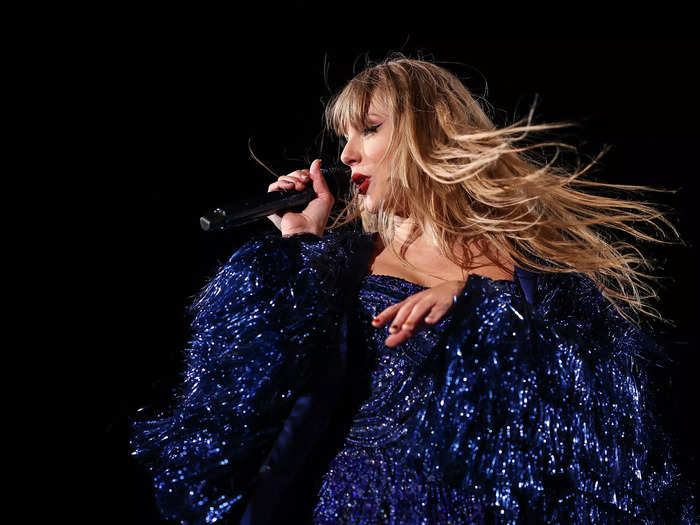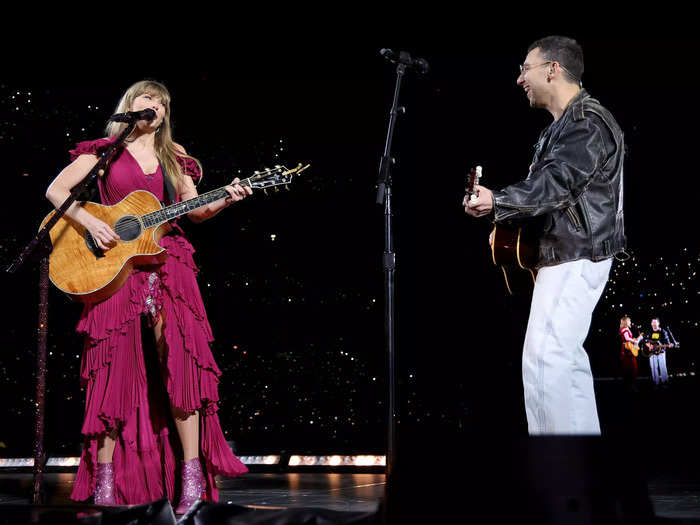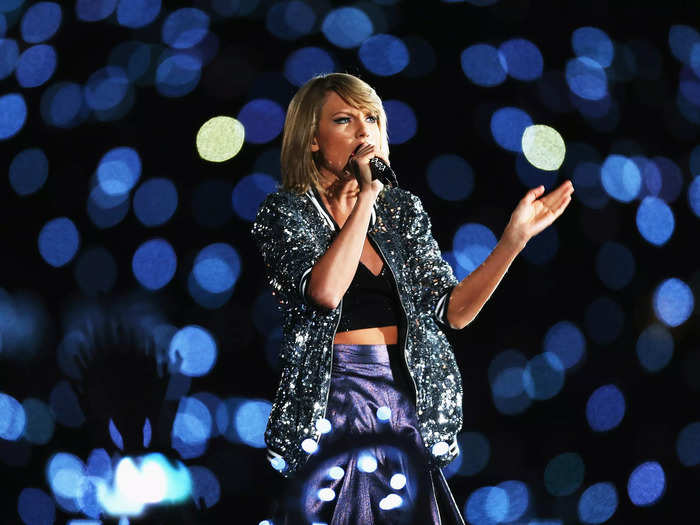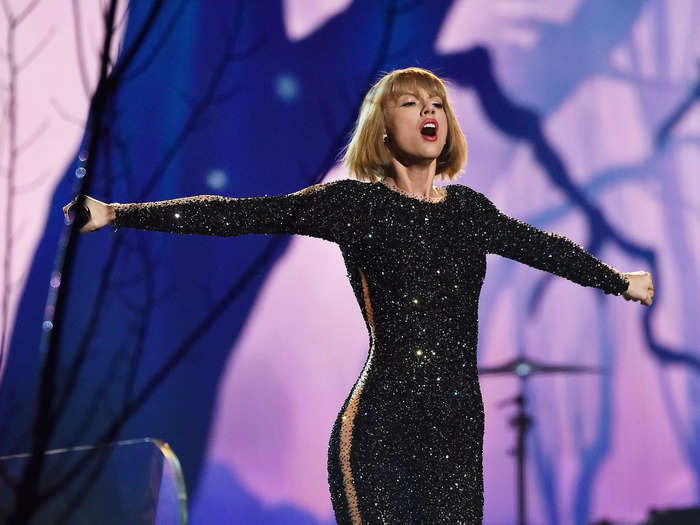- Home
- entertainment
- news
- All 5 vault tracks on Taylor Swift's '1989 (Taylor's Version),' ranked
All 5 vault tracks on Taylor Swift's '1989 (Taylor's Version),' ranked

- Taylor Swift released "1989 (Taylor's Version)" on Friday, which includes five vault tracks.
- Insider's senior music reporter ranked the never-before-heard songs from worst to best.
5. "Slut!"

Nobody will be more surprised than I was to find "Slut!" at the bottom of this ranking. It was the vault track I was most itching to hear. With an evocative title like that — and Swift's long, fraught history with slut-shaming — who could blame me?
The actual song is not at all what I expected. To be fair, I don't know what I expected, but certainly not a sparkly slow dance. The key lyric is not a feminist mantra or satirical critique, but a romantic shrug: "If I'm all dressed up, they might as well be looking at us / And if they call me a slut, you know it might be worth it for once."
Of course, that's not to say "Slut!" is a bad song. I like it! I especially like the line, "I'll pay the price, you won't," which underlines how women are disproportionately mocked and maligned for our choices — including romantic and sexual acts with men, who made the very same choices.
I also love how Swift slips in phrases like "flamingo pink," "aquamarine moonlit swimming pool," and "tangerine neon light" with casual ease. This is definitely the woman who put "kaleidoscope" in a pop song just because she's "obsessed with the word."
But all five of these vault tracks are very strong, and this is a ranking. Something has to be the worst. "Slut!" just doesn't have the same ardent, enticing energy as its fellows.
Swift revealed on Tumblr Music that she had to choose between "Blank Space" and "Slut!" to make the original tracklist for "1989." It goes without saying, but she made the right decision.
4. "Suburban Legends"

I don't enjoy putting "Suburban Legends" this low because it feels specifically designed to hurt me: an astrology-obsessed woman with vivid memories of my ex from suburbia, who kissed me in a way that might've screwed me up forever.
Once again, I am afraid that Swift has access to my diary. And once again, her music has reminded me that I'm not alone in my emotions, no matter how private and isolating those experiences can feel.
However, "Suburban Legends" suffers on this ranking because it doesn't quite belong in the cityscape of "1989." This is true for obvious lyrical reasons, but it also has the unmistakable air of a "Midnights" song. The pace is reminiscent of "You're on Your Own, Kid," the shimmering synths recall "Bejeweled," and the climactic outro ("You don't knock anymore and I always knew it / That my life would be ruined") is just like "Mastermind."
The overall effect is still good, but it is suspiciously familiar. I would've preferred to hear Swift's original vision for this song. Jack Antonoff, consider this a warning.
3. "Now That We Don't Talk"

"Now That We Don't Talk" explores the aftermath of heartbreak, but not in the same way as songs like "All You Had to Do Was Stay," "I Wish You Would," or "Clean." Swift isn't yearning for the romance she lost. She's adjusting to a new, disorienting reality — that her ex is simply existing without her.
Pop songs rarely focus on this component of a breakup because anger and sadness are sexier than silence. But as Swift wisely notes, it can be the most difficult to come to terms with: "I cannot be your friend," she laments. "I can't pretend it's platonic."
Losing a lover is also losing a companion, a confidant. But conversation doesn't come easily after mutual destruction has occurred.
This is one of Swift's shortest songs ever and it does end rather abruptly, but that fits nicely with its theme. After being in love, that person suddenly becomes a stranger again, a "shrouded mystery" with shared memories. It's weird and jarring.
Also, on a lighter note, I'm obsessed with how Swift absolutely cooks her ex in the outro: "Now that we don't talk, I don't have to pretend I like acid rock" made me laugh out loud. There's nothing better than shedding the pretension of someone you were trying to impress.
2. "Say Don't Go"

As soon as the ominous beat kicked in, I could tell right away that "Say Don't Go" has the juice of a Swiftian smash, the kind of song that will be screamed in stadiums for years to come. (Cowriter Diane Warren agrees: "I think it's a fucking hit," she told Rolling Stone.)
The big anthemic chorus swept in like a breath of fresh air, especially since it came after the pared-down twinkles of "Slut!" — and that was only a warmup for the bridge, one of Swift's best yet. ("Why'd you have to make me love you? I SAID I LOVE YOU!") This is pure "1989," a catchy blend of desperation, desire, and the optimistic delusions of youth.
In fact, "Say Don't Go" feels like the younger, more naive sister of "You're Losing Me," Swift's most recently written breakup song. They find her in similar positions, begging to be seen and loved in equal measure.
But where "You're Losing Me" is resigned and seething, "Say Don't Go" is stridently hopeful. Even the last line, "But you won't, but you won't, but you won't," almost feels like a challenge to prove her wrong.
1. "Is It Over Now?"

To paraphrase my editor Courteney Larocca, Swift should not be allowed to pose rhetorical questions anymore. "If one thing had been different, would everything be different today?" "Do you wish you could still touch her?" "Who could ever leave me, darling, but who could stay?" "Are we out of the woods yet?" "Was it over then? And is it over now?" Enough! You're hurting my feelings!
Yes, "Is It Over Now?" has instantly risen to the top echelon of Swift's existential crises. The song is a messy spill of cruel memories ("Red blood, white snow / Blue dress on a boat"), bitter accusations ("At least I had the decency to keep my nights out of sight"), and late-night confessions. She admits to fantasizing about "jumping off of very tall somethings" to win back the attention of her ex, and I hate to say that I get it.
Swift's breathless delivery is what clinches the song's power. She makes it sound essential, urgent, as though it's literally gushing out of her.
This is also where Antonoff's modernized, Bleachers-style production works best, even though I was originally thrown off by the "Midnights" vibe of the intro. (Was that just an alternate production draft for "Labyrinth" or what?) The stuttering drum beat in the last verse is the ultimate final flourish.
This is the only "1989" vault track that I've had on repeat. As soon as the song ends, I start again from the beginning. After all, that's the danger (and draw) of rhetorical questions. You can ask them over and over and you'll never be satisfied.
Popular Right Now
Advertisement